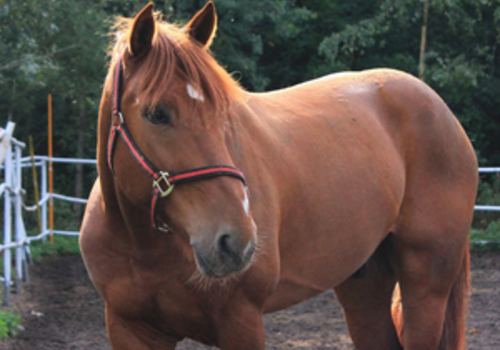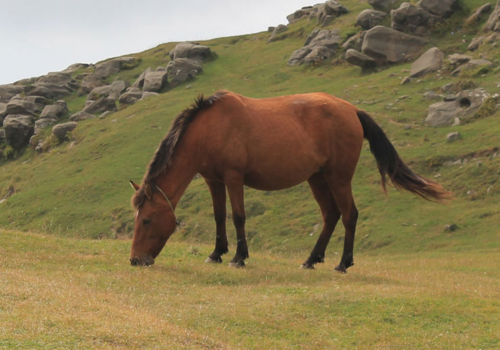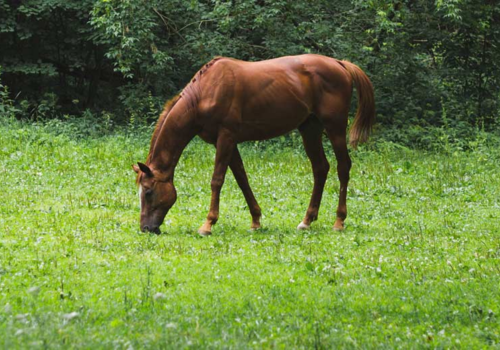
Paddock maintenance is a necessary part of keeping your horse's pasture in the best possible condition. In this guide, we offer up some simple maintenance tips you can start putting into practice straight away, as well as help you identify common signs your paddock may need some extra attention.
Maintenance tips to keep your paddock at its best
Regular paddock care ensures your pasture provides a dense and nutritious sward which in turn avoids having to excessively overseed and fertilise. It also helps keep weeds to a minimum and the soil free from parasites.
- Clear horse droppings across the paddock and in the stable on a daily basis
While this isn’t a job anyone is looking forward to, it’s absolutely essential for the health of your paddock grass. Removing droppings on a daily, or at least a very regular basis, will massively reduce the number of parasites in the paddock.
You won’t be able to fully remove all parasites from your paddock but removing manure quickly can help minimise the number of parasites drastically. Worm eggs, in particular, thrive in horse manure, so removing it regularly also helps remove their optimal environment.
- Always provide fresh, clean water
No one would feel that comfortable drinking a glass of water that’s been sitting outside for days. Anything could have flown into it and overall, stagnant water just isn’t that appealing. Your horse is no different and a fresh supply of water will keep them happy and healthy.
Fresh, clean water can help your horse maintain a healthy digestion system and reduce the risk of colic. If you’re concerned your hose may be dehydrated, look out for symptoms such as physical weakness, depression and sunken eyeballs.
- Ensure your horse has access to shelter
It’s important that your horse always has access to a dry area so they can get out from the rain. This is because horses who are left in the rain can develop something known as ‘rain rot’. Rain rot, which is also called rain scald, is a skin infection that causes scabs and lesions on a horse. It’s an unpleasant illness that is very painful and uncomfortable for your horse and is caused by their skin remaining wet for long periods of time.
The exact amount of time in the rain varies on the horse but making sure they have access to dry shelter and bringing them in if they’re enjoying the rain a bit too much will help avoid it.
- Follow an annual maintenance plan
The needs of your paddock and your horse will change throughout the year. Having an advanced plan of what needs to be done, and when, will save you a lot of time and stress in the long term.
An annual maintenance plan will involve harrowing, overseeding with the right grass seed mixture and using fertiliser when appropriate. This work is normally carried out in spring or autumn. It may be necessary to improve the ground by flattening the area, or by aerating the soil to ensure the ground has adequate drainage.
You can read our yearly paddock grass planner to get you started.
Common causes of damage to paddock grass
Now that we’ve discussed a few paddock maintenance tips, here are a few things to look out for that can damage your paddock’s health.
- Overgrazing
Overgrazing will occur when a single area is used for grazing for an extended period of time. Because the land is being constantly used, it doesn’t have a recovery period where the plants and vegetation can regrow and soil can rebuild nutrients.
You can tell if a land has been overgrazed by as you’ll start to notice patchy areas with excessive soil on show. This excessive soil can lead to erosion and overgrazing will also lead to poaching and weed invasion.
To achieve a mud-free horse paddock, it may be useful to employ a short term rotation, where horses are moved between three to four paddocks during the summer. This gives each area time to recover and regrow without a hungry horse nibbling its roots.
If laminitis is an issue, strip grazing can be used by dividing paddocks into strips using suitable fencing, to limit the intake of greedy horses and allow areas to rest. You can find more information in our guide on laminitis and how to prevent it.
- Under-grazing
Grass maintenance is about finding a happy medium, which is why under-grazing is another potential issue to watch out for. Under-grazing results in the grass growing tall which becomes less attractive to graze. It can happen for a variety of reasons and is especially common in spring when grass growth is especially rapid.
If this occurs, 'top' the paddock down to 4 inches or take a hay cut. Another way to deal with under-grazing is to look at how much grazing space your horses have access to. It may be that there is too much paddock space available for your horses to be able to eat. In which case it may be simplest to block off specific areas so your horses can focus on grazing in a more manageable space.
- Invasive Weeds & Poisonous Plants
It’s important to keep on top of any invasive weeds and poisonous plants in your paddock as they bring a wealth of problems. One of the most pressing reasons to deal with them is their toxicity. Read more about what to look out for in our handy guide on toxic plants for horses.
Annual overseeding will help to prevent the growth of weeds and invasive grasses, helping to maintain the sward quality and reduce poaching. When overseeding, keep an eye out for plants that are harmful or toxic and remove them regularly to prevent a build-up.
Choosing grass seed for your paddock
When overseeding and reseeding areas, choose a paddock grass seed that is best suited to your needs in both quantity and quality. For example, certain grass species are more suitable if a hay cut is required. You will also need a specific ryegrass-free grass seed if your horse is prone to laminitis.
We offer a range of paddock grass mixes specifically formulated to offer the best nutrients and most suitable - ensuring you find the one that perfectly matches your needs and your horses.
------------------
Have a question about horse paddock maintenance? Get in touch with our friendly team of experts, we’re always on hand to help.


